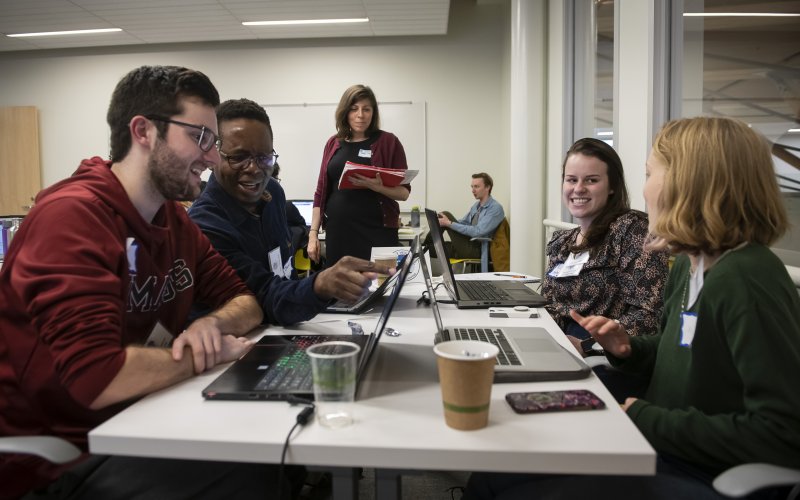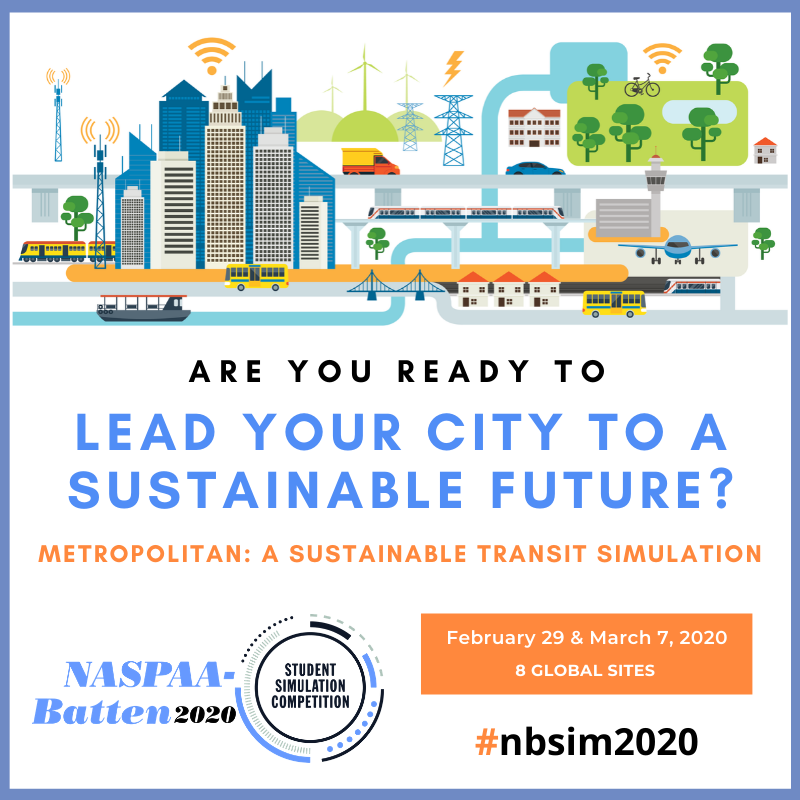Rockefeller to Serve as Host Site for Global Simulation Competition

ALBANY, N.Y. — On Saturday, March 7th, the University at Albany’s Rockefeller College of Public Affairs & Policy will host 50 graduate students from 15 universities participating in the 2020 NASPAA-Batten Student Simulation Competition. This year’s competition — a partnership between the University of Virginia Frank Batten School of Leadership and Public Policy and the Network of Schools of Public Policy, Affairs, and Administration (NASPAA) — will connect approximately 400 students from eight global host sites, including Budapest, Bangalore, and Sejong. UAlbany is one of five sites located in the United States along with Pedderdine University, University of Texas at Arlington, The Ohio State University, and George Mason University.
Participants in the competition will take on leadership roles in a simulated city and be challenged to implement policies that achieve the most sustainable public transit system. Developed by the Center for Leadership Simulation and Gaming (CLSG) at the Batten School, the simulation was built using real-world data and with the help of academic experts and practitioners in the field of transportation and sustainable policy.
“We built Metropolitan: A Sustainable Transit Simulation to bring sustainable city planning to life by providing participants a sense of the comprehensive thinking that this issue requires,” said CLSG Director Noah Myung. “Our students are passionate about sustainable policymaking and want opportunities to apply their knowledge. Metropolitan gives them that chance, challenging participants to think critically about the costs and benefits as well as primary and secondary effects of investments that can help build a more sustainable society.”
Built specifically for students of public policy, Metropolitan: A Sustainable Transit Simulation is a web-based experiential learning tool. Taking on roles such as city manager, treasurer, and head of the Department of Transportation, players will work in teams to build sustainable public transit infrastructure in their city. To be successful, team members must collaborate with each other while achieving individual objectives that are representative of their role. The game challenges participants to consider the personality of five different districts within their city, each with varying degrees of access and public transportation needs. Teams will be evaluated on their simulation scores, negotiation skills, and presentations made to regional site judges. A panel of prominent “super judges” will determine the global winning team of the entire competition who will be invited to attend the Global Leadership Summit in Washington, D.C. on June 7-9, 2020 hosted by the United Nations Association of the United States of America (UNA-USA). Second and third place will receive a generous cash prize.
“Simulation-based learning is an incredibly valuable tool, offering some of the most exciting, intense, and impactful learning on the planet for public affairs education,” said NASPAA Executive Director Laurel McFarland. “In the classroom, our graduate students have been trained to be problem solvers, team players, and analysts — these simulations enhance students’ abilities to tackle complex policy problems they may face in the real world. They'll be ready to take the insights from their sustainable cities simulation experience into whatever kind of public service career they embark upon.”
This is the sixth year that NASPAA has conducted the student competition and the fourth year partnering with the Batten School’s CLSG to produce the simulation. Thousands of students from NASPAA’s global network have participated in the competitions with each year examining a different multifaceted policy issue. For the 2019 NASPAA-Batten Student Simulation Competition, the CLSG created a simulation in which participant teams were asked to manage a refugee influx. Following the competition, CLSG developed a classroom version, which will soon be available free through their website. The simulation has already been used in university classrooms in Texas, China, and Virginia to teach important concepts about migration and integration policy, and give students a chance to hone skills in negotiation and critical thinking.



